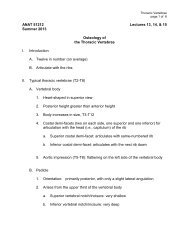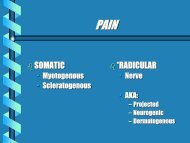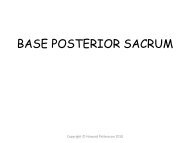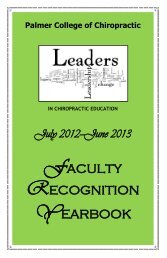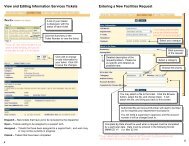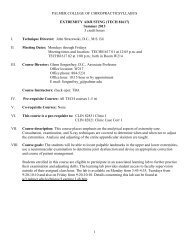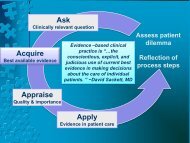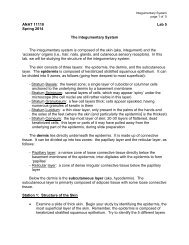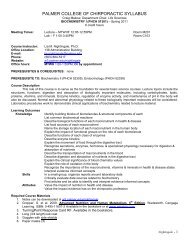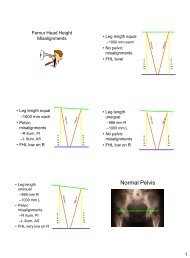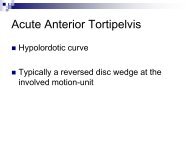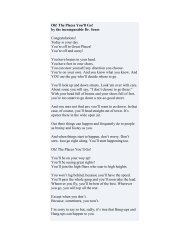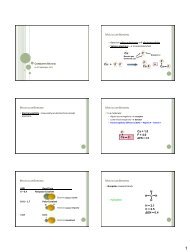RENAL PHYSIOLOGY COURSE: PHCH 62345 (2 Credit Hours, 3
RENAL PHYSIOLOGY COURSE: PHCH 62345 (2 Credit Hours, 3
RENAL PHYSIOLOGY COURSE: PHCH 62345 (2 Credit Hours, 3
You also want an ePaper? Increase the reach of your titles
YUMPU automatically turns print PDFs into web optimized ePapers that Google loves.
Summer 2013PALMER COLLEGE OF CHIROPRACTIC SYLLABUS<strong>PHYSIOLOGY</strong>/BIOCHEMISTRY/LIFE SCIENCESDirector: Craig Mekow, M.S.<strong>RENAL</strong> <strong>PHYSIOLOGY</strong><strong>COURSE</strong>: <strong>PHCH</strong> <strong>62345</strong> (2 <strong>Credit</strong> <strong>Hours</strong>, 3 Contact <strong>Hours</strong>)[APPROXIMATE EXPECTED OUTSIDE CLASSROOM HOURS: 3]MEETING TIME & PLACE: MWH, 9:20 – 10:10; P201Course Director: Saeed R. Faruqui, Ph.D., Professor of PhysiologyOffice: 149 Administration BuildingPhone: 884-5777E-mail: faruqui_s@palmer.eduWeb Site: w3.palmer.edu/faruquiYou will find important information regarding the course in my W3 web site. This includes syllabus,Renal Notes, study guide, overheads, assignments, exam breakdown and other useful links on RenalPhysiology course, and health in general. Browse and have fun. Also check out my Home Page inSunGARD for the syllabus and handouts at the following URL: https://portal.palmer.edu.Office <strong>Hours</strong>: 9:20 – 10:10 T; 10:15 – 11:05 and 11:10 - 12:00 W and H. You may see me other times byappointment.Prerequisites for Renal Physiology Class: <strong>PHCH</strong> 52340 (Cell Phys.), <strong>PHCH</strong> 52342 (Endocrinology), and<strong>PHCH</strong> 61343 (CVP).Prerequisite for Other Courses: None for this course.Co-requisites: NoneCourse Description:Physiological anatomy and basic renal physiology is presented in this course. Clinic application of kidneyfunction test, and plasma clearance is presented. Basic concepts relating to body fluid physiology arediscussed. Emphasis is placed on presentation of the mechanisms used by the kidney to maintain thenormal composition, volume and pH of the body fluids. Pathophysiology of the kidney in hypertension,nephrotic syndrome, edema, may also be covered.Course Learning Outcomes: Knowledge Student Will Posses:1. Describe the basic physiology of the major parts of the kidney and the urinary tract.2. Describe the functions of the nephron in epithelial transport.3. Describe glomerular filtration, reabsorption and secretion.4. Map the peripheral innervation to different parts of the urinary system.5. Explain the formation, excretion and composition of urine.6. Describe the regulation of body fluid physiology by the renal system.7. Describe the regulation of body fluid osmolality.8. Describe the regulation of acid-base balance by the kidneys.9. Explain the role of kidneys in keeping sodium and potassium balance in the body fluids.
Clinical Competencies Emphasized:Renal Physiology course provides the knowledge base for understanding the homeostatic stability as itrelates to correlation between structure and functions of tissues and organs involved in regulation ofbody fluid composition and the integration, as well as interrelationships between the differentphysiological body systems. This course offers information that is basic to various aspects of clinicalcompetencies such as Physical and Neuromuscular Exam, some Diagnostic studies (e.g., urine analysis)and clinical implications, but not limited to these. It is expected that upon completion of the course, thestudent should be able to demonstrate the attitude and physiological knowledge bases of the clinicalcompetencies as noted above.It is hoped that upon completion of the course, the student will develop a level of knowledge,comprehension, understanding and reasoning, as well as synthesis that will allow him/her integration ofphysiological concepts with other basic science and chiropractic science courses.Evaluation Methods:Three examinations and Problem-based Learning (PBL)/Case Study assignments are given. Theexaminations are primarily objective type, but may vary at the discretion of the Course Director. Theycover materials presented in lectures, handout(s) and reading assignments. Exams will be given in theclassroom where we meet regularly.PBL Assignments 30 points See Course Calendar on page 6.Exam 1 30 points Monday, August 5 th at 9:20 in classExam 2 30 points Thursday, September 19 th at 9:20 in classFinal Exam 30 points Tuesday, October 15 th at 7:30 in W210Total:120 pointsGrading Scale: Grades will be calculated according to the table below:Points Grade Grade Point108 - 120 A 90 to 100%96 - 107 B 80 to 89%78 – 95 C 65 to 79%77 - 00 F < 65%INCIncompleteWWithdrawalReviewing Exams and/or Assignments:All exams and/or assignments must be viewed by the student within 2 weeks after grade posting.Extra <strong>Credit</strong>:Bonus attendance quizzes maybe given throughout the term at the discretion of the Instructor. Seemake-up policy below.Policies:Missed Exam/Quizzes: Exams and quizzes must be taken when scheduled. The student is allowed tomake-up only one exam. If a student is unable to make up an exam when the make-up exam isscheduled, it will count as a zero (no credit). The make-up exam format may be objective, fill-in theblank, essay, true and false, or any combination. Students MUST have a valid emergency situation2
(health, family emergencies or legal) and the student must show the instructor documentation. Thismust be cleared with the Course Director in advance. Lack of preparation is not considered a validexcuse. A make-up exam will be given at the discretion of the Course Director in this term within a weekafter the exam is given in class. If for unforeseen circumstances the make-up exam is not taken after ithas been cleared by me, the student will be awarded an “I” grade (incomplete), which MUST be madeup next term. The make-up exam for the incomplete grade will be given in my office on Tuesday,October 29, 2013 @ 9:20Regarding Use of Electronic Devices during ExamFor testing purposes, electronic devices with storage-retrieval capabilities are strictly prohibited. Cellphones should be turned “OFF” or to “SILENT or VIBRATORY MODE” while the student is in class. Anyuse of the cell phones is to be done outside the classroom; the student shall leave the room withoutdisturbing the remaining students. Students will not be allowed to use electronic devices to audio recordlectures in the classroom without the prior written approval of the instructor. Video recording of lectureis strictly prohibited and would lead to the filing of an ethics violation. The instructor reserves the rightto deny or limit student use of electronic devices within the classroom settings. Standard calculatorsmaybe used.Posting of Exam Scores and GradesAll grades will be posted by the student’s matriculation number. According to the Family Rights andPrivacy Act, you have the right to request not to have your grades posted. If you wish to do so, please goto the Registrar’s office to fill a form indicating that you do not want to have your exam/quiz scoresposted.Academic Integrity:Students are expected to comply with Palmer’s Student Code of Ethics. Students are stronglyencouraged to carefully read the entire Student Code of Ethics as published in the Student Handbook.Cheating, plagiarism, other acts of dishonesty and/or any other violations of Palmer’s Student Code ofEthics may result in the filing of a charge of misconduct under the Student Disciplinary Code asdescribed in the Student Handbook. Sanctions up to and including suspension or dismissal from theCollege may be imposed upon students found to have violated the Code of Student Ethics. Please referto the Palmer Student handbook or contact the Office of Adjudication/Compliance (4 th floor,Administration Building, extension 5476) should you have any questions.Regarding Dropping the ClassThe student can drop this class on or before Wednesday, August 21 st . Withdrawals have to be clearedthrough the department of Academic Counseling.Regarding Possession of Old ExamsExams are not returned to students, and possession of old exams is considered to be a violation of thecode of ethics signed by the students. Use of old exams or possession of the same will result inappropriate actions being taken.AttendanceThe student is strongly recommended to attend the scheduled classes, since most of the material forexams will be emphasized in class. Unannounced attendance quizzes are also given at the discretion ofthe Instructor, which if missed, cannot be made up.3
Religious ObservancesIn order to accommodate an individual student’s participation in religious observances, Palmer Collegerequires that the student advise each of their instructors, in writing at the beginning of a term or at least30 days prior, of the desired absence.Academic Adjustments for Qualified Students with Disabilities: Palmer College of Chiropractic makesreasonable academic adjustments for qualified students with disabilities, as required by law. Anyqualified student with a disability who requires a reasonable academic adjustment to perform theacademic and technical standards requisite to participation in this course is to contact the Office ofStudent Learning and Development (1 st floor, West Hall 128B, extension 5408) to request such anacademic adjustment. For more details on College policy regarding this area, please refer to theHandbook for Students and Applicants with Disabilities.Visitors to the Classroom: The classroom environment, including labs and other instructional venues,are reserved for enrolled students only. Visitors (non students and children) are not permitted in anyinstructional venue without receiving prior approval by the course instructor and departmentadministrator. Even with prior permission, it is the right of the instructor to request that visitors leavethe classroom setting should it be deemed necessary or appropriate by the instructor.Student ProfessionalismThe students are expected to behave professionally in the classroom, and in the Faculty offices.Unprofessional and unethical conduct (which is in violation of the College Policy on these issues) will bereported to the office of Adjudication/Compliance.Texts/ReferencesRequired:1. Guyton, A C and John E Hall, Textbook of Medical Physiology, 12th ed. Philadelphia:Saunders, 2011. Also available in eBook version by Inkling.com. (May be possible topurchase by chapter.)Suggested Reviews for National Board Exams:1. Preston, R. and Wilson, T. Lippincott’s Illustrated Reviews: Physiology. Lippincott Williams& Wilkins, 20132. COMLEX Level 1 Physiology Lecture Notes, Kaplanmedical.com, 2011Suggested Books:1. Wolters Kluwer. Professional Guide to Pathophysiology, 3 rd edition, Lippincott Williams &Wilkins, 20112. Rubin,R and Strayer S. Pathology Clinicopathologic Foundations and Medicine, 6 th ed.,2011.3. Costanzo, L.S. Physiology, 4 th ed., Saunders-Elsevier, 2010.4. Rhoades, RA and Bell, D.R. Medical Physiology, 3 rd ed., Lippincott Williams & Wilkins, 2009.4
Tentative Outline of Topics Covered in Class:I. Introduction to Renal System of the BodyII. Physiology of Body FluidsIII. Structure and Function of the Kidneys and the Lower Urinary TractIV. Glomerular Filtration and Renal Blood FlowV. Renal Transport Mechanisms (Electrolyte and Water Reabsorption through the Tubule)VI. Regulation of Body Fluid OsmolalityVII. Regulation of ECF VolumeVIII. Regulation of Potassium BalanceIX. Regulation of Acid-base BalanceWhat Exams Will CoverEXAMSExam 1:Exam 2:Final Exam:MATERIALI. Introduction to Renal System of the Body,II. Physiology of Body Fluids,III. Structure and Function of the Kidneys andthe Lower Urinary TractIV. Glomerular Filtration and Renal Blood Flow,V. Renal Transport Mechanisms (Electrolyte andWater Reabsorption through the Tubules) andVI. Regulation of Body Fluid OsmolalityVII. Regulation of Effective Circulating Volume,VIII. Regulation of Potassium Balance, IX.Regulation of Acid-base BalanceReadings from Textbook of Medical Physiology by A.C. Guyton:Topics I – III: Chapters 25 – 26, pages 285 – 310.Topics IV, V, VI: Chapters 26, 27, 28, pages 310 – 360.Topics VII – VIII: Chapter 29, pages 361 – 378.Topic IX: Chapter 30, pages 379 – 412.Problem-Based Learning (PBL)/Case Studies Assignments:PBL demands from the learner the acquisition of critical knowledge, problem solving proficiency, selfdirectedlearning strategies, and team participation skills. During the problem solving process, thestudents assume increasing responsibility for their learning, giving them more motivation and morefeeling of accomplishment, setting the pattern for them to become successful life-long learners. Thefaculty becomes resources, guides and evaluators in their problem solving efforts.The Process Utilized:During the first two weeks of the class you will be asked to sign up for PBL group assignments. Eachgroup will have no more than 5 students. Your group will decide a group leader who will be responsiblefor coordinating and turning in one report to me for the entire group at the announced deadline date.You are supposed to work within your group. Each person MUST participate in doing each assignmentin order to come to a satisfactory answer to the PBL Case Study problem given. If an individual doesnot participate, he/she will receive zero in the assignment.5
There will be three such assignments given throughout the term. Single reports will not be accepted.No late papers will be accepted and there are NO make-ups for the PBL assignments. No electroniccopies will be accepted. It is your responsibility to contact your Group Leader, and it is the GroupLeader’s responsibility to collect the group for doing the PBL assignment.Format:All PBL assignments must be typed, and on a separate sheet. You can work on the assignment sheetprovided to you, but only answers that are on a separate sheet will be used for grading. You mustinclude the original sheet when you turn in your assignment. You will lose points if you are missing thetitle page, the original sheet, and the effort grade sheets. Further, points will be deducted if the PBLassignment sheets are not stapled.Grading:The grading sheet utilized for the PBL is on my website (w3.palmer.edu/faruqui) and placed on Reservein the Library. There are 10 total points possible for each PBL assignment.Eight of the 10 points are earned in the answers to the questions, and they should include: 1)your physiological answers to the assigned problem(s), 2) the scientific basis/logic utilized toderive your answer. To simplify it, you must defend your answer(s) to the problem(s) whether itis a right answer or a wrong answer. If calculations are required, the equations and how youderived your answer(s) should also be given in detail.The other two points will be from evaluation of each group member. Each person in the groupmust turn in his/her own evaluation form (also found on my web site, and placed on Reserve inthe Library). This will be the Effort Grade. Each member of the group will give an Effort Gradeout of 100%, and turn it in to me separately on the day the assignment is due. If you do not turnin an evaluation form, you will lose two points for the effort portion of the grade.Forms:All forms for the PBL assignment can be found on my website, and also on Reserve in the Library. Theseinclude the title page, the grading format, and the effort grade sheet.Academic Calendar: See next page.Prepared: May 20136
ACADEMIC CALENDAR – SUMMER 2013 (64 CLASS DAYS)<strong>RENAL</strong> <strong>PHYSIOLOGY</strong>JULYAUGUSTSEPTEMBERSunday Monday Tuesday Wednesday Thursday Friday Saturday1 2 3 (4) IndependenceDay Break91011Classes BeginIntro to Renal7 8 FacultyIn-Service/NewStudent Orientation14 15 RegistrationCloses16 17Syllabus &IntroductionBody FluidPhysiology21 22 23 24 25A & P of Kidney& UT5 612 13Physiology18 19 2026 2728 29 30 31 12 3GFR4 56 78910EXAM 1Renal Transport Homecoming – Homecoming – HomecomingNo classes No classes11 1213 14 15 16 17PBL 1 Due18 19 20 21Trimester22 23 24Midpoint-Last Dayto Drop Classes25 2627 28 2930 31PBL 2 DueBody FluidOsmolality1 (2) Labor Day NoClasses8 NBCE Parts I,II, III & PT15 1622 239 No Classes-FacultyIn-ServiceECVPBL 3 Due3 4 No classes4 th – 10 th tri onlyNBCE study day5 No classes4 th – 10 th tri NBCEstudy day6 No Classes –NBCE Parts I, II,III & PT10 11 12 13 1417 18Founder’s Day1924 25 26EXAM 2K Balance20 2127 287NBCE Parts I,II, III & PTOCTOBER29 30 1 23 4 5Acid-Base Balance6 7* 8** 9** Classes End 10 Study Day 1112Final Exams13 14Final Exams15<strong>RENAL</strong> FINAL16Final Exams17Final Exams18Graduation1920 21 22 23 24 25 26Fall Interim: Saturday, Oct 19, 2013 – Sunday, Oct 27, 2013 Faculty In-Service: Monday, October 28, 2013Classes Resume: Tuesday, October 29, 2013( ) Indicates College HolidayNote: NBCE Deadlines for Part I, Part II, Part III, & PT – July 2, 2013 for exam date September 6-8, 2013.The late application deadline is July 16, 2013.7



